Greece in Winter: 5 Reasons Why it’s the Best Time to Go
Sun-kissed beaches, ancient ruins and picturesque towns make Greece a popular choice for holidaymakers, especially at the height of European summer. Conversely, travelling to Greece in winter may not be the automatic choice for most people, but it could be the best one that you make. Here’s what you can expect.
What is the weather in Greece in winter?
Winter temperatures in Greece can vary a lot. You’ll typically see highs of around 15 and lows of 6 degrees Celcius in Athens between December and February. Things get colder as you head further north, and warmer in the various islands of the Aegean and Ionian seas.
However, don’t be surprised if the weather changes suddenly. There can be Halcyon days between Christmas and Valentine’s where the mercury can exceed 20 degrees Celcius, or even snowfall that brings everything to a standstill. It snowed in Athens in 2022 and 2023, and it thankfully lasted only a day.
Winter is also the wettest season in Greece, with December to February seeing an average of nine rainy days each. In reality, you may not be affected that much. Our 10-day stay in mid-January saw only one wet day, and the precipitation lasted until the afternoon rather than coming down in a short and heavy thunderstorm.
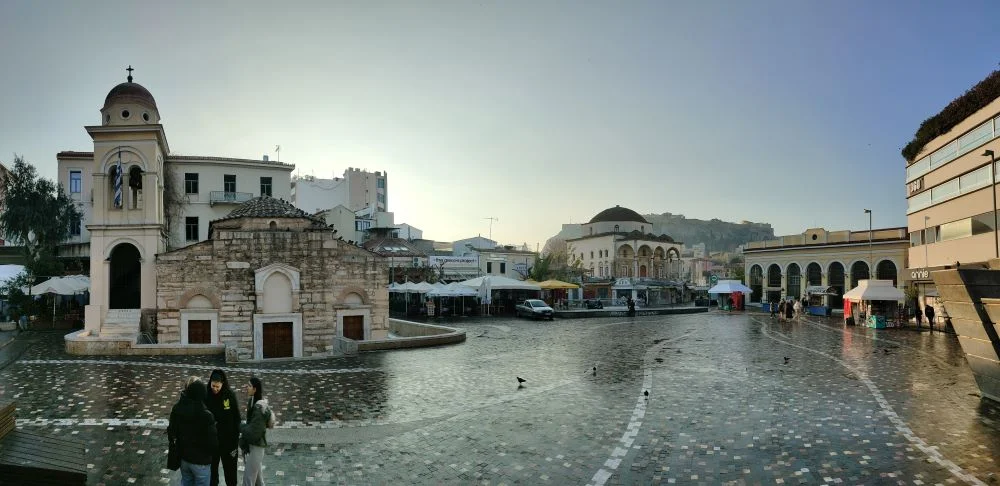
The disadvantages of visiting Greece in winter
For people who cannot handle cold weather, the choice is clear. But there’s at least one other consideration one must make for a Greek winter holiday.
Fewer choices
Can you visit Greek islands in winter? Let’s get this misconception out of the way: the popular Greek islands like Santorini no longer officially close in winter to tourism. However, they will be relatively less convenient to get to. Fewer ferries run from Athens and between the islands since it’s mostly locals who use the service. You can use sites like Ferryhopper to check the schedules.
To visit the Greek islands in winter, you’ll probably need to fly from the airport in Athens because most international airlines operate direct flights from the rest of Europe to the islands only during the peak season. There can be up to nine return flights a day to Santorini and 13 to Heraklion on Crete from the capital on Aegean, Sky Express and Volotea.
Once you’re there, many accommodations do not take bookings for the season and use it to carry out repairs. The same goes for dining establishments, especially those that cater for the dietary needs of foreigners. The recommendations of your friends who visited in the high season will not be reliable because that restaurant they went to may be closed. You’ll also find the outdoor pools drained, and that hostel rooftop with a view of the Parthenon may be locked.
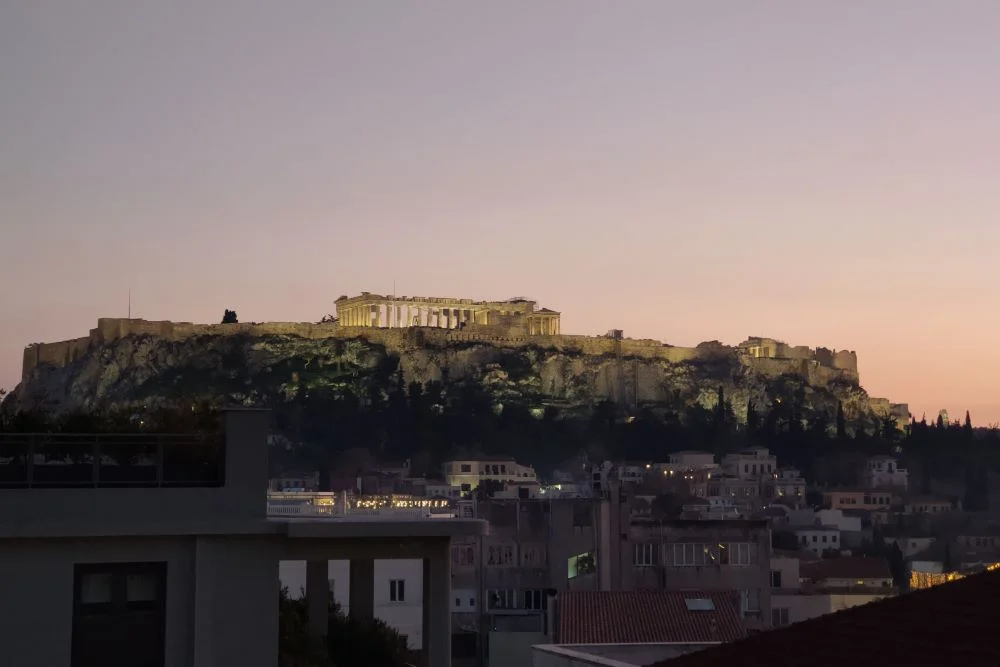
Why visit Greece in winter, then?
Still, is Greece worth visiting in winter when places are going to be closed? I have way more reasons why
No crowds
In my opinion, this is the biggest upside of visiting Greece in the winter. There will be far fewer tourists everywhere since the Europeans are not on their summer holidays and there are next to no cruise ships disgorging their passengers onto the narrow streets of Fira.
If you wake up early enough, you might get the Parthenon and other sites all to yourself. Even later in the day, there’s not too long a wait to get in and a healthy amount of space to the next person.
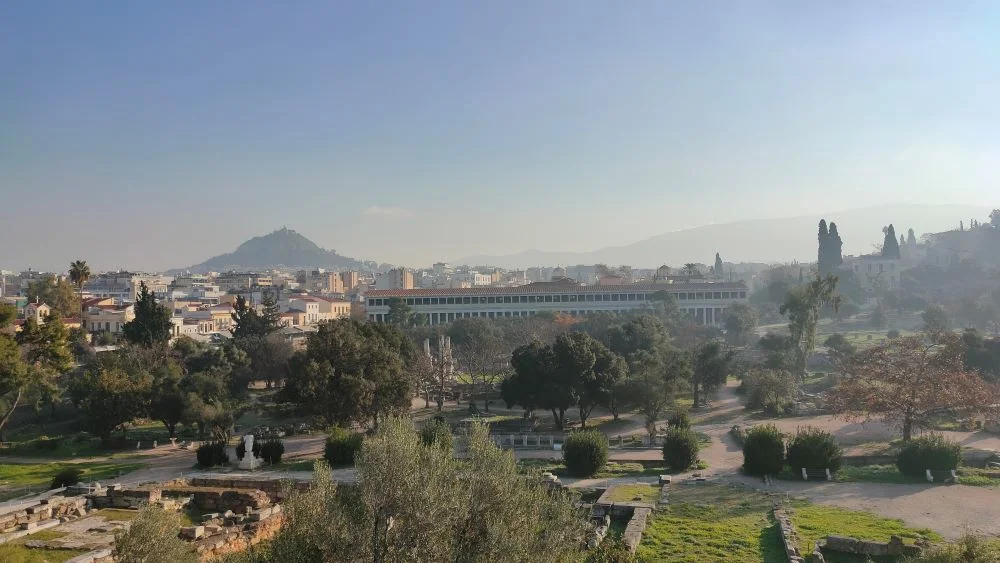
Perhaps the one exception that we encountered was the ceremonial change of the guard at Syntagma Square. The best viewing spots were filled up an hour before the start. I couldn’t imagine what it’s like waiting in high season, which leads us to the next point.
Safer weather
Greek winter is probably no beach lover’s idea of “good weather”. There’s no denying, however, that (aside from the freak snowstorm), Greece in winter is a lot safer. Temperatures in summer can exceed 40 degrees in summer, and there’s next to no shade at the top of the Acropolis, in the Ancient Agora or on Lycabettus Hill. The authorities went as far as closing the Acropolis at midday during heatwaves in 2023 and 2024. Heat stroke is a real risk with all that smooth marble reflecting the sun’s rays. Waiting shoulder-to-shoulder with other sweaty people in queues to board cable cars or climb slopes is no-one’s idea of fun.
Lower prices
If you like the idea of saving money, then you’re in for a treat. Many accommodations, even the popular ones, that stay open through the winter in Greece, will be much cheaper, with nightly rates of 100 euros or even less.
The admission fees for Athens’ major attractions (the Acropolis, the Ancient Agora, the Roman Agora, Hadrian’s Library, the Temple of Olympian Zeus, the Kerameikos, and Aristotle’s Lyceum) * and the National Museum of Archaeology are also halved from November to March. At the Acropolis Museum, the tickets go for 5 euros less.
* There is no winter discount on the combination ticket that includes all seven of these ancient sites, so you won’t get your money’s worth if you visit only a few of them on that ticket. You could choose to buy it anyway, and consider the leftover change a donation.

It’s more sustainable
Some people will contend that there’s no way overseas travel by air is sustainable, but hear me out. Visiting Greece in winter means you bring income in the low season, mitigating the “feast and famine” phenomenon where businesses are reliant on their summer takings. If more people do it to make it worthwhile to stay open in winter, more locals in the tourism industry can stay employed year-round. Let’s not forget you’re also not contributing to the strain on millennia-old sites and resources when you don’t go when everyone else is there.
Get to know the locals
As mentioned earlier, fewer places operate through winter, especially on the islands. However, locals still live there, and what does stay open serves their needs. That means you get to go to the little taverns they go to, and eat what they eat, and experience the renown Greek hospitality.

Things to do in Greece in winter
It would be stupid to promote visiting Greece in winter without suggesting where to go and what to do, so here are my suggestions:
Where to go in Greece in winter
Practically every inhabited Greek city, island and town remains open through the winter, and though the opening hours are shorter, you can still do almost everything you can do in the summer. If you are looking for real winter activities, Arachova is the country’s most popular ski resort and one of the best winter destinations in Greece. It’s the one place that still snows regularly, but that snowfall is getting later and thinner by the year.
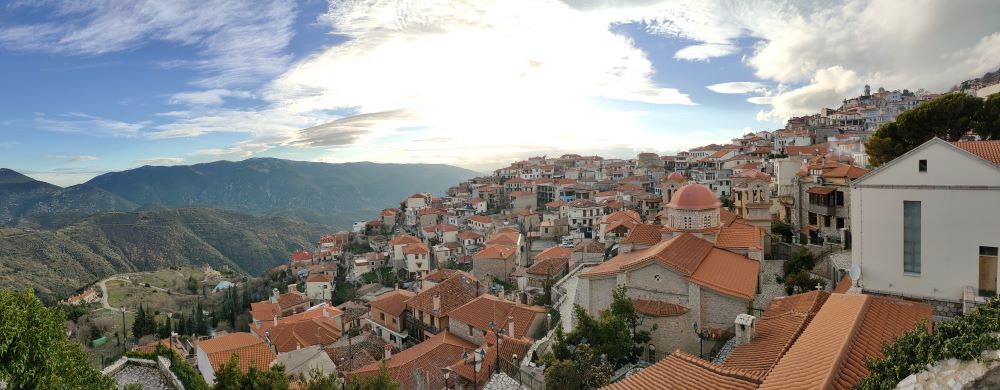
What to do in Greece in winter
Take your chance to go on long hikes without breaking a sweat, like the route between Fira and Oia on Santorini, or up to the monasteries of Meteora. When your arms and legs are covered to stay warm, you won’t have to choose between the dress code in the monasteries and your comfort (though ladies wearing jeans or tights would still need to don a long skirt or a sarong). The slower pace lets you take in views that you’d miss in a car or a bus.
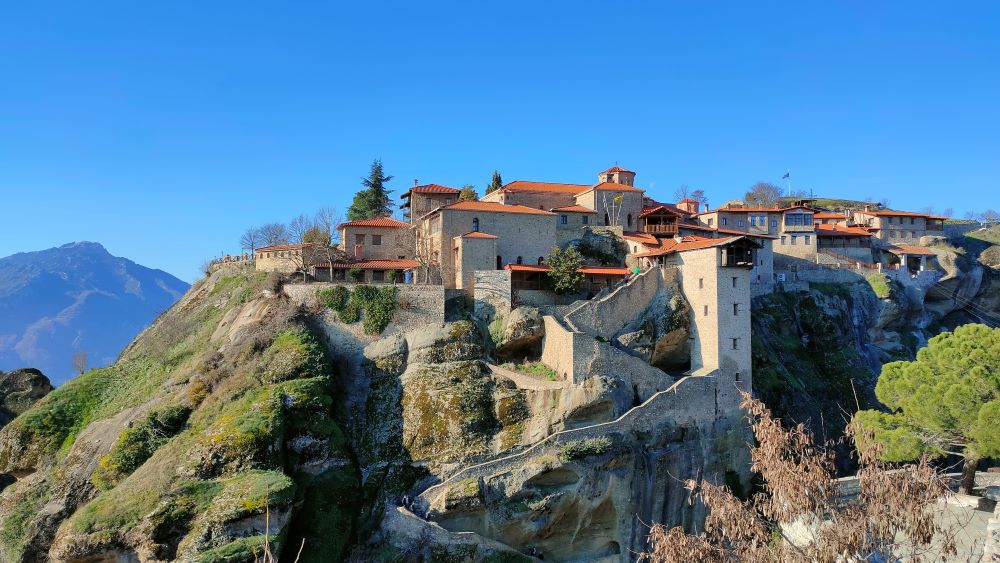
Greek Orthodox Christmas falls on the 25th of December like in most of the rest of the world and it’s just as special a season to be in the country. The churches and streets are decorated and bakeries bring out seasonal specialties like kourampiedes (buttery almond biscuits). There isn’t a long tradition of Christmas markets like in Germany but you can find a few like The Christmas Factory!
Winter also a good time to try warm and hearty Greek dishes like moussaka (baked eggplant mash with minced meat) and kokoretsi (spiced lamb offal sausage). There’s also a plethora of vegetarian and vegan dishes in the taverns, like giant beans and stuffed tomatoes and vine leaves. Wash it down with Greek ouzo or even a Greek craft beer.
And if you encounter one of those rainy days, there are many indoor museums where you (and the children) can while your time away. There’s the Acropolis Museum (absolutely essential pairing with a visit to the Acropolis itself), the National Archaeology Museum, the Byzantine and Christian Museum, the Kotsanas Museum of Ancient Greek Technology (great for engaging the young ones), just to name a few.
Conclusions about travelling to Greece in winter
As long as you don’t need to dip into an outdoor body of water, when your schedule permits, visiting Greece in winter has massive advantages. You reaps real savings while enjoying your holiday without the crowds and benefiting the local economy in a more sustainable way.